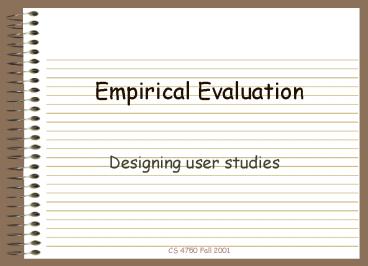Empirical Evaluation
1 / 19
Title: Empirical Evaluation
1
Empirical Evaluation
Designing user studies
2
Agenda
- Questions
- Exam 2 next Monday
- Project Part 3
- Experimental design
- Wednesday understanding HCI statistics
- Jason Brotherton
3
Project Part 3
- Deciding on final design
4
Project Part 3
- Creating evaluation plan
5
Working on Intuition
- Some techniques use this
- cognitive walkthrough
- heuristic evaluation
- formative exercises rely on this somewhat
- We cannot always predict impact of systems on
users before the system exists.
6
Why empirical studies?
- Summative Quantitative
- Requires resources
- Wont other methods be more effective and less
expensive?
7
Experimental design
- Need a system and subjects
- Controlled experiment to prove some relationship
between users and system.
8
Experimental factors
- Subjects
- Variables
- controlled / independent
- measured / dependent
- Hypothesis
9
Experimental condition
- Determined by levels of independent variables.
- Number of experimental conditions is important.
10
How many subjects?
- Book advice
- at least 10
- Other advice
- 6 subjects per experimental condition
11
Experimental purpose
- Reveal influence of independent variables on the
dependent variables. - Eliminate possibility of chance relationship.
12
The null hypothesis
- The independent variables do not influence the
dependent variables. - Statistical analysis aims to prove more than
chance relationship.
13
Confidence statements
- Goal of an experiment is to get gt95 confidence
in significance of result - that is, null hypothesis disproved
- OR, there is an influence
- ORR, only 1 in 20 chance that difference occurred
due to random chance
14
Subjects Experimental Conditions
- Between-groups (randomized)
- Each subject assigned to single experimental
condition - Within-groups
- Each subject tested on all conditions
15
Comparison
- Between-groups
- no learning effects
- more subjects needed need careful subject
selection - Within-groups
- fewer subjects
- potential learning, so mix ordering of conditions
16
Analyzing data
- Relationship between analysis and experimental
design - Look at data
- Save data
17
Results possible
- Is there a difference?
- How big is the difference?
- Accuracy of estimate
18
Advice
- Data quality
- avoid error bias
- Data reliability
- multiple observers, rules for measurement
- Determine central tendency
- mean, trimming, median, variance
19
Confounding factors
- Controlling all the variables































